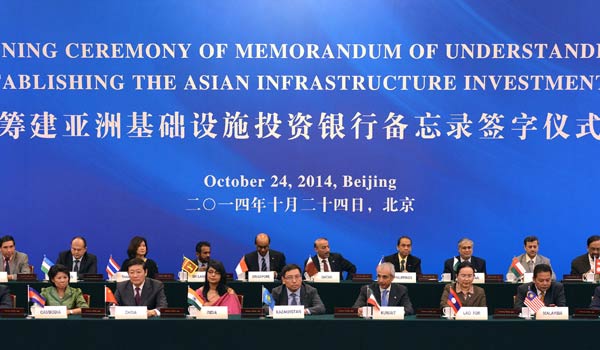AIIB to help deepen relations with EU
By Fang Lexian (chinadaily.com.cn) Updated: 2015-04-15 10:26
 |
|
The signing ceremony of memorandum of understanding on establishing the Asian Infrastructure Investment Bank (AIIB) is held in Beijing, Oct 24 2014. [Photo/Xinhua] |
The bold entries of Germany, Britain, France and Italy, the largest economies and principal US allies in Europe, into the Asian Infrastructure Investment Bank is not only of symbolic significance to but also of great importance for China-Europe cooperation.
Since the four countries are also the core members of the G7 and the European Union, their move to join a non-regional, China-proposed multilateral financial body has also prompted other countries to follow in their footsteps. Even some other US allies have ignored Washington's opposition to apply for the AIIB's membership.
The founding membership will be finalized on April 15. So far, at least 15 European countries have applied to join the AIIB as founding members by March 31. This means Europe will have the largest number of AIIB members after Asia, which will help increase the bank's representation and stability coefficients.
By joining or applying to join the AIIB, the European countries have exhibited their strategic vision and will to create new opportunities for deeper China-Europe cooperation, more so because their decisions were made in the face of US opposition.
These countries' decisions are in the interest of Europe and reflect their long-term strategic vision, because the rise of China and Asia's fast-growing economy offer enormous opportunities for development. Their decisions also mean European countries, still battling economic woes, have a positive attitude toward cooperation with emerging economies in Asia, led by China.
The Chinese government had been reiterating that it welcomed non-regional countries into AIIB. But initially the response from outside Asia was, at best, lukewarm. Then came the radical change after Britain announced it wants to join the AIIB. Despite the success, however, China neither wants to use the expanded AIIB membership, especially from European countries, to trumpet its diplomatic success, nor does it want to embarrass Washington. There is one thing though that China wants to emphasize: the establishment of the AIIB does not mean it poses a challenge to the US-dominated world financial order.
But in contrast to the Chinese government's low-profile official response, some media outlets and netizens have gone overboard with their reactions, because they believe the European countries have defied the US for their own good. In fact, the reactions suggest the image of the four EU members has improved among Chinese people, which will help improve China-Europe relations.
Since the issuing of the 2020 China-Europe strategic plan in 2013 and President Xi Jinping's visit to Europe in 2014, China and Europe have been making great efforts to forge a comprehensive strategic partnership with peace, growth, reform and civilization at its core for mutual benefit.
Among the important goals of the 2020 plan are exploring an innovative model for financial cooperation, improving the financial conditions of small and medium-sized enterprises, and promoting diversified financial services. Agreements have also been reached between the two sides on how to make bilateral trade and two-way investments more convenient, and maintain financial stability.
Given that the AIIB, based on the principles of "consultation, joint building and sharing", has received the support of European countries, it can be safely said that Europe now has a positive attitude toward Asia's economic prospects.
That European countries have chosen to join the AIIB in defiance of the US has not only caused the Chinese government and people to acknowledge Europe's constructive role in helping build the global economic governance mechanism, but will also help China and Europe expand and deepen their cooperation.
The author is a research fellow with the National Academy of Development and Strategy, Renmin University of China.

I’ve lived in China for quite a considerable time including my graduate school years, travelled and worked in a few cities and still choose my destination taking into consideration the density of smog or PM2.5 particulate matter in the region.











